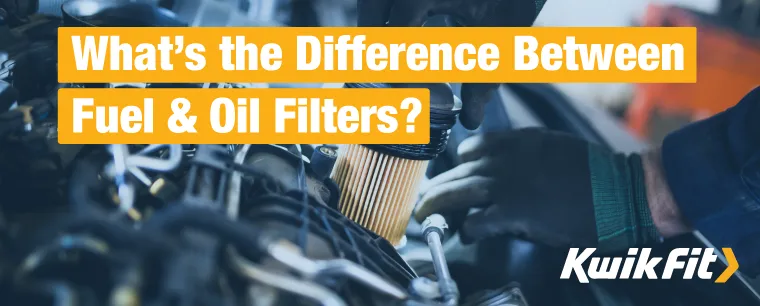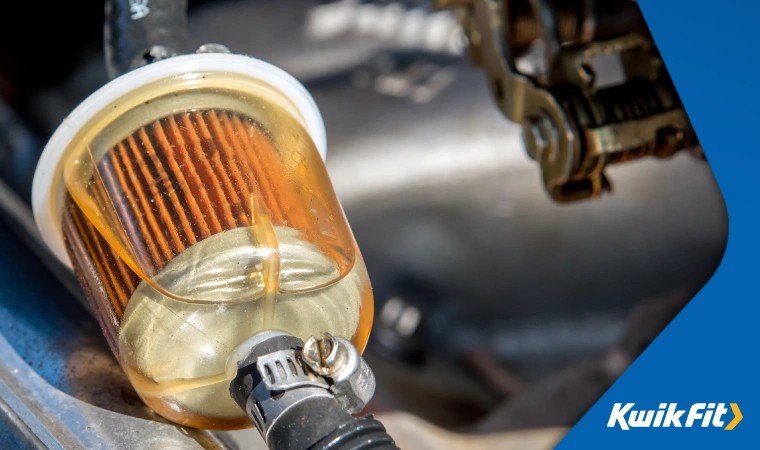What's the Difference Between Fuel & Oil Filters?
Jack Dreyer | Wednesday 23rd November 2022 11:15am

Weíve recently had a number of questions about the difference between fuel & oil filters. While our customers are clearly aware that one thing filters fuel and the other thing filters oil, the question theyíre really asking is: why? Why does fuel need to be filtered, and why does oil need to be filtered?
Letís have a look.
How fuel filters work
So letís begin by looking at fuel. In the early days of fuel-powered mechanics, fuel was as big and clunky as wood and coal Ė and when youíre throwing things into a furnace, it doesnít really matter if thereís any variation in the size or purity of fuel.
Modern cars, however, are finely tuned machines that operate using precise mechanics. Because the combustion engine works specifically by controlling precise miniature explosions, the fuel thatís being injected into that engine needs to be just as precisely controlled.
If you let too much gunk get into the system, itís quickly blocked up and stops working.
Fuel filters work like any filters do: they create a meshed barrier so that only things of a certain size can get through. Think of fuel filters like stacked sieves Ė you want the fuel to get through but not anything else that may have got in.
Diesel fuel tends to be less refined Ė itís more naturally like an oil (which is why itís really smelly if you ever get it on yourself, it sticks like an oil does) and it also tends to contain more contaminants. Things like dirt, water, and bacteria (which collects into Ďdiesel sludgeí) all need to be filtered out before the diesel can be burned efficiently.
Petrol is more refined (if you spill it, for example, itíll evaporate) so tends to contain less particulate contaminants as it comes Ė but the petrol filter is there in order to catch anything that may have mixed into the fuel from the tank or during refilling.

What do oil filters do?
Oil in car systems like the engine & gearbox is there in order to provide lubrication for those systems. There are lots of moving parts that require contact with each other, and when a lot of metal is spinning around a lot of other metal, it helps to smooth things along.
Good quality oil, and regular oil changes, help to maintain the overall life of the components by reducing how quickly they wear. But as part of the lubrication process, the oil builds up tiny metal shavings that end up feeling like grit. Itís why engine oil, for example, starts as a light brown treacle colour but turns black after some time.
The oil filters are there in order to filter out these small metal particles that build up Ė all so that you donít need to change the oil as frequently. If these parts werenít filtered, youíd get a similar wearing effect as without the oil Ė because the oil saturated with gritty metal particles behaves in the same was as sandpaper does.
These differ from fuel filters mainly in the size of the meshes. They fundamentally do the same thing but for different parts.
How frequently do filters need to be replaced?
Different car models will require different service intervals, so itís best to check your particular carís service schedule. Most diesel filters need replacing every 10,000 to 25,000 miles and most petrol filters only need to be changed every 30,000 - 40,000 miles. Most oil filters, on the other hand, need to be changed once along with oil changes every 3-6 months.
If you need an oil & oil filter change, get in touch with the experts at your local Kwik Fit centre.
Any facts, figures and prices shown in our blog articles are correct at time of publication.
Featured Articles
Is it Illegal to Drive With One Headlight?
Saturday 19th July 2025
Wondering if itís illegal to drive with one headlight? Learn about the safety risks and penalties of illegal blown bulbs and why you should fix them promptly.
Air Con in EVs & Hybrids: Experts Answer Your Questions
Monday 30th June 2025
Does air con drain EV batteries? Can you use the air con while charging an electric car? Find out the answers to these questions & more from Kwik Fitís experts.
Why Is Your Car Making a Noise? Fixes & Tips
Friday 13th June 2025
When your car starts making unexpected noises, it can certainly be quite disconcerting; it may be nothing to worry about, but hereís what you need to know.









